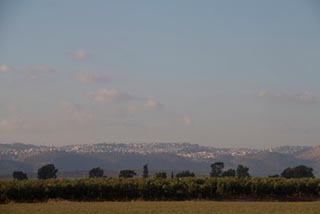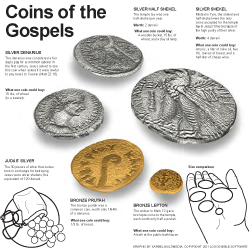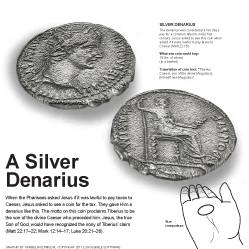6:1–6 Jesus’ hometown fails to receive Him, citing the knowledge of His family and origins as the reason. Jesus rebukes them and does not perform miracles, since they are unable to receive Him in faith. |
6:1 his hometown Refers to Nazareth, a town in Galilee (1:9). See Matt 2:19–23.
6:2 Where did this man get these things Here and in Mark 1:27, onlookers relate Jesus’ teaching to His acts of power.
granted to this man Illustrates the Nazarenes’ belief that Jesus’ wisdom is not His own, but has come from some external, unknown source (vv. 14–16).
6:3 carpenter The Greek text here could refer to any specialized craftsperson, such as a woodworker or stonemason.
brother Jesus’ siblings mentioned in this verse may be Mary and Joseph’s children or Joseph’s children by another, deceased, wife (making him a widower prior to marrying Mary).
James The nt letter of James is often attributed to this brother of Jesus.
Joses Referred to in the Greek text here as Joses, which is another form of the name Joseph; the spelling “Joseph” is used for the same brother in the parallel verse of Matt 13:55.
Judas The individual to whom the nt Letter of Jude is often attributed.
Simon Outside of the mention in a parallel passage in Matt 13:55, this brother of Jesus is also otherwise unknown (compare John 7:5; Acts 1:14).
sisters Mark 3:35 may also allude to Jesus’ sisters.
they were offended by him This abrupt shift from amazement to offense is unexplained. Verse 4 seems to imply that no one respected Jesus in Nazareth after this point, suggesting that those who were amazed (v. 2) became convinced by certain naysayers. It may also be that some people believed but the majority of people agreed with the opinion of those who cited Jesus’ background as evidence of why not to believe Him.
6:4 not without honor Jesus declares that it is normal for a prophet’s own people to reject the prophet. This statement reintroduces the issue of what true family is (see 3:31–35).
among his relatives, and in his own household See 3:20–34.
6:7–13 Jesus fulfills the purpose for which He chose the twelve apostles. Mark set up the initial choosing of the twelve apostles with a story of opposition (3:1–6) followed by a summary of how Jesus sent out His disciples (3:7–12). He now repeats that narrative sequence: opposition, ministry, and the sending of the twelve. |
6:7 two by two Probably relates to their role as witnesses to the acceptance or rejection of God’s rule (v. 11). In the Pentateuch, God mandates that two witnesses are required in a trial to authenticate the testimony (Deut 17:6; 19:15).
6:8 take along nothing Jesus sends the disciples out in a manner that requires them to both depend on God for their provision and to receive the hospitality of others.
6:11 shake off the dust See note on Matt 10:14.
6:13 The disciples emulate Jesus’ ministry, which they have observed throughout the Gospel. |
6:14–29 The narrative shifts to events surrounding John the Baptist, who was last mentioned in Mark 1:9–11; his disciples were mentioned in 2:18. |
6:14 King Herod Refers to Herod Antipas, the Jewish ruler of Galilee
the Jewish ruler of Galilee and Perea
and Perea (see note on Luke 3:1).
(see note on Luke 3:1).
 Political Leaders in the New Testament Table
Political Leaders in the New Testament Table
raised from the dead Mark hasn’t yet mentioned John’s death; it is reported in Mark 6:17–29. Herod’s fear suggests that he saw a link between John and Jesus and perceived both as political threats.
6:15 He is Elijah Second Kings 2:11 records that the prophet Elijah did not die, but was taken up into heaven alive. As a result of this and Malachi’s prophecy many Jews believed he would return someday (Mal 4:5–6; compare Mark 9:11; 15:35–36).
6:17 Herodias, the wife of Philip According to the first-century Jewish historian Josephus, Herodias was a granddaughter of Herod the Great. Her first husband (Philip) and second husband (Antipas, who is called Herod in this text) were both sons of Herod the Great by different mothers, making them her uncles as well as her spouses (Josephus, Antiquities 18.109–10, 136).
6:18 It is not permitted Herodias was initially married to Philip, the half-brother of Herod Antipas. Herod divorced his first wife in order to marry Herodias, taking her away from Philip (Josephus, Antiquities 18.109–10). John condemns this as unlawful because it violates Lev 18:16 and Lev 20:21.
6:19 Herodias held a grudge Given John the Baptist’s influence, his disapproval of Herod and Herodias’ marriage would threaten her position as queen.
6:20 was afraid of John Herod may fear John in the sense that he is afraid of John’s power from Yahweh and the wrath Yahweh may bring against him if he was to execute John. Herod may also fear the political ramifications of killing John: The Jewish people could rise against Herod because John’s ministry was very popular (Mark 1:5).
was greatly perplexed Similar to those who do not understand Jesus’ message (see note on 4:12).
6:22 daughter of Herodias See note on Matt 14:6.
danced In Graeco-Roman culture, dancing at banquets was an activity reserved for hired female entertainers whose role was to provide artistic and erotic diversion for the male dinner guests. It was not viewed as an appropriate activity for honorable women, especially not the host’s own daughter.
Ask me for whatever you want Kings in the ancient Near East commonly made absurd statements like this on monumental occasions in a show of power (Mark 6:21).
6:23 up to half my kingdom An idiom, not a literal expression (compare Esth 5:3, 6).
6:30–44 Having described King Herod’s despicable birthday banquet, Mark presents Jesus presiding over an even larger feast as the true leader of God’s kingdom who truly provides for God’s people. |
Jesus Feeds 5,000 People | |||
6:30 the apostles regathered The departure and return of the twelve apostles frames the story of John’s death (Mark 6:14–29), which interrupts the apostles’ mission as a flashback.
6:34 sheep without a shepherd A common ot expression used to describe Israel’s inadequate or oppressive leadership (e.g., 1 Kgs 22:17; compare Ezek 34).
6:35 The place is desolate The two feeding stories that frame this section of Mark’s Gospel take place in the wilderness (compare Mark 8:4). This barren setting contrasts with Herod’s lavish banquet.
6:37 two hundred denarii The Greek text here, which refers to 200 denarii, references a silver coin roughly corresponding to the value of a day’s labor. Two hundred denarii was a substantial sum of money, sufficient to feed 5,000 men and the other people present (v. 44).
6:40 by hundreds and by fifties Israel camped in groups of hundreds and fifties during its flight from Egypt (Exod 18:25). Jesus’ organization of the crowd in this way represents the symbolism of this meal: With the coming of God’s rule, a new exodus is taking place (compare Mark 1:15).
6:41 gave them to his disciples This verse parallels Jesus’ distribution of bread at the Passover meal in 14:22–23. In both passages, Jesus takes bread, gives thanks, breaks the bread, and gives it to His disciples (compare 8:6).
6:45–56 Jesus demonstrates His divine power once again (vv. 45–52) over both nature and disease (vv. 53–56). |
6:45 Bethsaida A fishing village on the northeastern shore of the Sea of Galilee.
6:48 fourth watch From chs. 3:00–6:00 a.m. See note on Matt 14:25.
walking on the sea The ability to control the sea is a divine attribute in both the ot (e.g., Pss 18:15; 65:7) and Graeco-Roman tradition (such as seen in Homer, Iliad 13.23–31 and Virgil, Aeneid 5.816–21).
Miracles at the Sea of Galilee | |
Jesus Calms a Storm | |
Jesus Walks on Water | |
The Miraculous Catch of Fish | |
A Second Miraculous Catch | |
pass by The same expression appears in the ot when God displays His glory to people (Exod 33:17–34:8; 1 Kgs 19:11–13).
6:50 I am he Jesus’ words likely evoke God’s self-identification to Moses at the burning bush (Exod 3:14).
6:52 they did not understand Jesus might have expected them to understand the significance of gathering 12 baskets of leftovers (Mark 8:17–21). Although Jesus gives the disciples special access to knowledge about the kingdom (4:11), there are points in Mark where the disciples are ignorant of the significance of Jesus’ teaching (e.g., 7:17–18; 9:32) or actions (e.g., 8:21; 10:13).
hearts were hardened Indicates stubbornness (see Exod 4:21 and note). Based on Jesus’ later comment in Mark 8:17–21, it seems that it is the disciples’ own will that keeps them from understanding the full meaning of Jesus’ message.
6:53 Gennesaret Jesus had instructed the disciples to go to Bethsaida (v. 45), at the northeastern end of the lake. Gennesaret, however, is the region on the lake’s western shore.

|
About Faithlife Study BibleFaithlife Study Bible (FSB) is your guide to the ancient world of the Old and New Testaments, with study notes and articles that draw from a wide range of academic research. FSB helps you learn how to think about interpretation methods and issues so that you can gain a deeper understanding of the text. |
| Copyright |
Copyright 2012 Logos Bible Software. |
| Support Info | fsb |
 Loading…
Loading…






